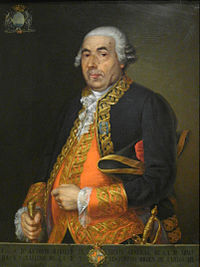Antonio Barceló
This article includes a list of general references, but it lacks sufficient corresponding inline citations. (March 2013) |

Antonio Barceló y Pont de la Terra (1 January 1717, in Palma, Majorca – 30 January 1797, in idem) (in Catalan Antoni Barceló i Pont de la Terra) was a Spanish mariner and privateer, lieutenant general (equivalent to Admiral) of the Spanish Royal Armada.
Of humble origins, Barceló rose to officer of the Spanish Armada on military merits alone, an unusual. He was a leading figure against Barbary piracy and slave trade in the Western Mediterranean, adopting their tactics to counter them and serving himself as a pirate hunter for much of his career.[1] He later developed extensively the usage of naval artillery and gunboats.[1]
Biography[edit]
He was the oldest of the five sons of Onofre Barceló, a small time privateer against the Muslim piracy that attacked the coasts of the Western Mediterranean. Antonio started his career as a cabin boy in Onofre's xebec Santo Cristo de Santa Margarita, eventually replacing Onofre as its captain, and added a job as a royal mail ship between Palma de Mallorca and Barcelona.[1]
With the Royal Armada focused on the War of Jenkins' Ear since 1739, Barceló and other privateers were recruited and received the official mission to prevent further piracy.[1] Eventually he became lieutenant general of the Spanish Royal Armada.[2]
He is also famous for his bombardments of Algiers (Bombardment of Algiers in August 1783 and 2nd Bombardment of Algiers in July 1784) and use of gunboats during the Great Siege of Gibraltar.
Antonio is also credited of putting sailors and ships under the patronage of the Virgin of Carmel and shifting away from the patronage of St. Elmo. Today, on the feast day of the Viring of Carmel, blessing of boats still takes place in many Spanish towns.[3][4]
References[edit]
- ^ a b c d Rodríguez González 2016.
- ^ P. Villatorio, Manuel (20 December 2016). "El corsario español Antonio Barceló machacó el nido de piratas de Argel sin tener apenas bajas". ABC (in Spanish). Vocento. Retrieved 11 May 2019.
- ^ Raventós, Carme (1998). Nuestra Señora del Carmen. Centre de Pastoral Litúrgica. p. 16. ISBN 9788474674668. Retrieved 3 July 2023.
- ^ "Festa de la Mare de Déu del Carme". www.barcelona.cat. Ajuntament de Barcelona. Retrieved 3 July 2023.
- Rodríguez González, Agustín (2016). Antonio Barceló. EDAF. ISBN 978-8441437135.
- San Juan, Víctor (2019). Breve historia de las batallas navales de las fragatas. Nowtilus. ISBN 978-8413050768.
- Guimerá Ravina, Agustín (2008). Guerra naval en la Revolución y el Imperio: Bloqueos y operaciones anfibias, 1793-1815. Marcial Pons Historia. ISBN 978-8496467804.
